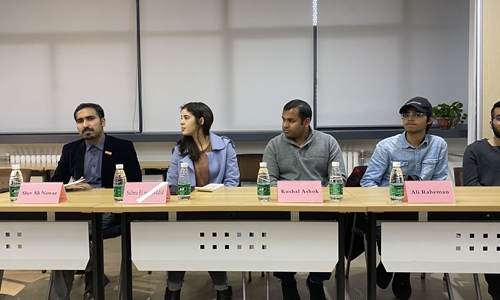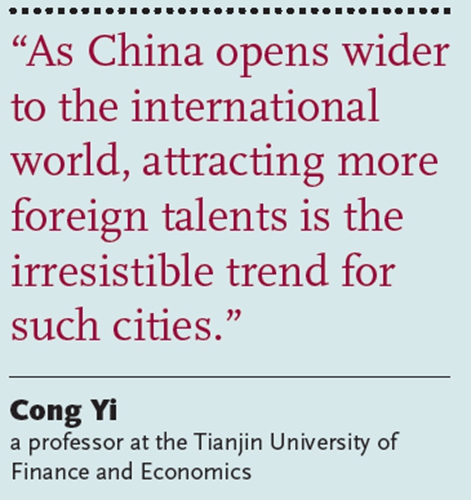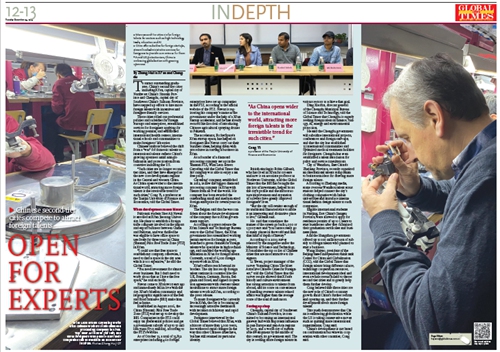HOME >> CHINA
Chinese second-tier cities compete to attract foreign talents
By Zhang Hui in Xi'an and Chengdu Source:Global Times Published: 2019/12/23 19:38:40
○ More second-tier cities vie for foreign talents for sectors such as high technology, trade, education and AI
○ Cities offer subsidies for foreign startups, streamlined administrative services for foreigners to provide convenience for them
○ Amid US protectionism, China is embracing globalization with growing openness

These cities rolled out preferential policies and subsidies for foreign startups and enterprises, streamlined services for foreigners applying for working permits, and established international health centers, international schools and communities to make foreigners' life easier.
Chinese analysts believed the shift from a "war" for domestic talents to international talents reflects China's growing openness amid anti-globalization and protectionism from countries including the US.
"Such cities are no longer second-tier cities, and they have emerged as the new core development regions in the Central and western China. As China opens wider to the international world, attracting more foreign talents is the irresistible trend for such cities," Cong Yi, a professor at the Tianjin University of Finance and Economics, told the Global Times.

Pakistani student Sher Ali Nawaz is enrolled at Xi'an Jiaotong University. He plans to establish a foreign trade company involved in the import and export business between China and Pakistan, and was thrilled he was eligible to have office space to use freely for three years in China (Shaanxi) Pilot Free Trade Zone (FTZ) in Xi'an.
"I could use that free space to establish my company, otherwise, I need to find a space in the city area which is too expensive," he told the Global Times.
"You need investment for almost every business. But I don't need to worry about that as I have the free space," he said excitedly.
Nawaz came to Xi'an two years ago and immediately fell in love with the city. Xi'an's Muslim community and its geographic significance of the Belt and Road Initiative (BRI) make him feel at home.
Established in August 2016, the China (Shaanxi) Pilot Free Trade Zone (FTZ) was set up to develop the BRI. Companies in the FTZ could enjoy tax preferential policies and get a government subsidy of up to 50 million yuan ($7.13 million), according to the FTZ's website.
As of October 31, a total of 35,832 enterprises including 460 foreign enterprises have set up companies in the FTZ, according to the official website of the FTZ. Nawaz is registering his company's name at the government under the help of a Xi'an startup accelerator, and he has already secured his first deal of introducing Chinese agricultural spraying drones to Pakistan.
The accelerator, RocketSpace's Xi'an startup space, has helped six foreigners like Nawaz carry out their business ideas, helping them with procedures in starting a business in Xi'an.
As a founder of a diamond processing company set up in the Shaanxi FTZ, Wim Leon Ernest Gayseling told the Global Times that his company was able to enjoy a tax free policy.
Gayseling' company, established in 2012, is now the biggest diamond processing company in Xi'an with clients from all over the world. His company has been awarded the outstanding small and medium-sized foreign enterprise for several years in Xi'an.
The Belgian said that he was confident about the future development of the company due to Xi'an government support.
According to a press release the Xi'an Science and Technology Bureau sent to the Global Times, the Xi'an government has streamlined working permit services for foreign experts, launched a green channel for foreign talents who specialize in high technology, and canceled the working age limitation in Xi'an for foreign talents. Currently, a total of 6,100 foreign experts work in Xi'an.
Xi'an's efforts reach beyond its borders. The city has set up foreign talent stations in countries like the UK, France, Germany, Russia, Belgium and Israel, and signed cooperation agreements with overseas talent institutions to attract more foreign talents to work in Xi'an, according to the press release.
To many foreigners who currently live in Xi'an, the city is becoming an increasingly attractive destination with its intact rich history and rapid development.
Foreigners interviewed by the Global Times believed that Xi'an, with a history of more than 3,000 years, has witnessed rapid changes in the way that other Chinese cities have, but has still retained its particular identity.
British sinologist Robin Gilbank, who has lived in Xi'an for 11 years and now is an associate professor at Northwest University, told the Global Times that the BRI has brought the city lots of investment, helped boost the city's profile and the infrastructure improvement and expansion of subways have greatly improved foreigners' lives.
"But the city still retains enough of its traditional characteristics to make it an interesting and distinctive place to live," Gilbank said.
He said that sometimes the names of the streets go back 1,000 or 1,500 years and "you cannot really go to many places in the world and find that kind of depth of history."
According to a 2019 survey released by the magazine under the Ministry of Science and Technology, Xi'an makes the top 10 list of Chinese cities that are most attractive to foreigners.
Li Yiwen, project manager of the survey "Amazing China-The Most Attractive Chinese Cities for Foreigners," told the Global Times that the survey results showed that Xi'an's history and culture environment has strong attraction to talents from abroad, and its score on convenience of handling overseas talents related affairs was higher than the average score of the total 18 indicators.

Setting up shop
Chengdu, capital city of Southwest China's Sichuan Province, is committed to becoming an international gateway hub with important influence in pan-Europe and pan-Asia regions by 2035, and a world city of sustainable development by the middle of this century, its government said. The city is seeking more foreign talents in various sectors to achieve that goal.
Ding Xiaobin, director general of the Chengdu Municipal Bureau of Science and Technology, told the Global Times that Chengdu is eagerly seeking foreign talent in finance, biology, AI, energy and environmental protection.
He said the Chengdu government will subsidize international projects, conferences and foreign start-ups, and that the city has established 35 international communities and optimized medical treatment facilities for foreigners. Chengdu has even established a talent association for policy and service consultations.
City of Wenzhou, East China's Zhejiang Province, recently organized an international talents symposium to brainstorm ideas for drawing more foreign talents.
According to Zhejiang media, some overseas Wenzhou talent scout stations helped connect the city's clothing companies with Italian universities and introduce international fashion design talents to such companies.
Eligible international students in Nanjing, East China's Jiangsu Province, were allowed to apply for residence permits of up to 5 years to start businesses after they submitted their graduation certificates and business plans.
And the Hangzhou government offered up to 100 million yuan of subsidy to foreign talents who planned to start a business.
Wang Huiyao, president of the Beijing-based independent think tank Center for China and Globalization (CCG), told the Global Times that foreign talents bring different culture, technology cooperation resources, international development ideal and even a whole research field to theses second-tier cities and to greatly help them further develop.
Cong believed that these cities are the new pole of China's economy growth amid China's further reform and opening-up, and their further development needs more foreign talents.
This push demonstrates that China is embracing globalization while the US is taking conservative moves such as quitting more international organizations, Cong said.
China's development is not based on confrontation but win-win cooperation with other countries, Cong said.

Newspaper headline: Open for Experts
○ Cities offer subsidies for foreign startups, streamlined administrative services for foreigners to provide convenience for them
○ Amid US protectionism, China is embracing globalization with growing openness

Wim Leon Ernest Gayseling works with Chinese workers at his diamond processing company in Xi'an. Photo: Zhang Hui/ GT
To attract outstanding graduates, China's second-tier cities including Xi'an, capital city of Northwest China's Shaanxi Province and Chengdu, capital city of Southwest China's Sichuan Province, have stepped up efforts to lure more foreign talents with incentives and foreigner-friendly services.These cities rolled out preferential policies and subsidies for foreign startups and enterprises, streamlined services for foreigners applying for working permits, and established international health centers, international schools and communities to make foreigners' life easier.
Chinese analysts believed the shift from a "war" for domestic talents to international talents reflects China's growing openness amid anti-globalization and protectionism from countries including the US.
"Such cities are no longer second-tier cities, and they have emerged as the new core development regions in the Central and western China. As China opens wider to the international world, attracting more foreign talents is the irresistible trend for such cities," Cong Yi, a professor at the Tianjin University of Finance and Economics, told the Global Times.

Sher Ali Nawaz (far left) and three foreigners who plan to start their companies talk to media in an accelerator in Xi'an. Photo: Zhang Hui/ GT
When development meets historyPakistani student Sher Ali Nawaz is enrolled at Xi'an Jiaotong University. He plans to establish a foreign trade company involved in the import and export business between China and Pakistan, and was thrilled he was eligible to have office space to use freely for three years in China (Shaanxi) Pilot Free Trade Zone (FTZ) in Xi'an.
"I could use that free space to establish my company, otherwise, I need to find a space in the city area which is too expensive," he told the Global Times.
"You need investment for almost every business. But I don't need to worry about that as I have the free space," he said excitedly.
Nawaz came to Xi'an two years ago and immediately fell in love with the city. Xi'an's Muslim community and its geographic significance of the Belt and Road Initiative (BRI) make him feel at home.
Established in August 2016, the China (Shaanxi) Pilot Free Trade Zone (FTZ) was set up to develop the BRI. Companies in the FTZ could enjoy tax preferential policies and get a government subsidy of up to 50 million yuan ($7.13 million), according to the FTZ's website.
As of October 31, a total of 35,832 enterprises including 460 foreign enterprises have set up companies in the FTZ, according to the official website of the FTZ. Nawaz is registering his company's name at the government under the help of a Xi'an startup accelerator, and he has already secured his first deal of introducing Chinese agricultural spraying drones to Pakistan.
The accelerator, RocketSpace's Xi'an startup space, has helped six foreigners like Nawaz carry out their business ideas, helping them with procedures in starting a business in Xi'an.
As a founder of a diamond processing company set up in the Shaanxi FTZ, Wim Leon Ernest Gayseling told the Global Times that his company was able to enjoy a tax free policy.
Gayseling' company, established in 2012, is now the biggest diamond processing company in Xi'an with clients from all over the world. His company has been awarded the outstanding small and medium-sized foreign enterprise for several years in Xi'an.
The Belgian said that he was confident about the future development of the company due to Xi'an government support.
According to a press release the Xi'an Science and Technology Bureau sent to the Global Times, the Xi'an government has streamlined working permit services for foreign experts, launched a green channel for foreign talents who specialize in high technology, and canceled the working age limitation in Xi'an for foreign talents. Currently, a total of 6,100 foreign experts work in Xi'an.
Xi'an's efforts reach beyond its borders. The city has set up foreign talent stations in countries like the UK, France, Germany, Russia, Belgium and Israel, and signed cooperation agreements with overseas talent institutions to attract more foreign talents to work in Xi'an, according to the press release.
To many foreigners who currently live in Xi'an, the city is becoming an increasingly attractive destination with its intact rich history and rapid development.
Foreigners interviewed by the Global Times believed that Xi'an, with a history of more than 3,000 years, has witnessed rapid changes in the way that other Chinese cities have, but has still retained its particular identity.
British sinologist Robin Gilbank, who has lived in Xi'an for 11 years and now is an associate professor at Northwest University, told the Global Times that the BRI has brought the city lots of investment, helped boost the city's profile and the infrastructure improvement and expansion of subways have greatly improved foreigners' lives.
"But the city still retains enough of its traditional characteristics to make it an interesting and distinctive place to live," Gilbank said.
He said that sometimes the names of the streets go back 1,000 or 1,500 years and "you cannot really go to many places in the world and find that kind of depth of history."
According to a 2019 survey released by the magazine under the Ministry of Science and Technology, Xi'an makes the top 10 list of Chinese cities that are most attractive to foreigners.
Li Yiwen, project manager of the survey "Amazing China-The Most Attractive Chinese Cities for Foreigners," told the Global Times that the survey results showed that Xi'an's history and culture environment has strong attraction to talents from abroad, and its score on convenience of handling overseas talents related affairs was higher than the average score of the total 18 indicators.

Setting up shop
Chengdu, capital city of Southwest China's Sichuan Province, is committed to becoming an international gateway hub with important influence in pan-Europe and pan-Asia regions by 2035, and a world city of sustainable development by the middle of this century, its government said. The city is seeking more foreign talents in various sectors to achieve that goal.
Ding Xiaobin, director general of the Chengdu Municipal Bureau of Science and Technology, told the Global Times that Chengdu is eagerly seeking foreign talent in finance, biology, AI, energy and environmental protection.
He said the Chengdu government will subsidize international projects, conferences and foreign start-ups, and that the city has established 35 international communities and optimized medical treatment facilities for foreigners. Chengdu has even established a talent association for policy and service consultations.
City of Wenzhou, East China's Zhejiang Province, recently organized an international talents symposium to brainstorm ideas for drawing more foreign talents.
According to Zhejiang media, some overseas Wenzhou talent scout stations helped connect the city's clothing companies with Italian universities and introduce international fashion design talents to such companies.
Eligible international students in Nanjing, East China's Jiangsu Province, were allowed to apply for residence permits of up to 5 years to start businesses after they submitted their graduation certificates and business plans.
And the Hangzhou government offered up to 100 million yuan of subsidy to foreign talents who planned to start a business.
Wang Huiyao, president of the Beijing-based independent think tank Center for China and Globalization (CCG), told the Global Times that foreign talents bring different culture, technology cooperation resources, international development ideal and even a whole research field to theses second-tier cities and to greatly help them further develop.
Cong believed that these cities are the new pole of China's economy growth amid China's further reform and opening-up, and their further development needs more foreign talents.
This push demonstrates that China is embracing globalization while the US is taking conservative moves such as quitting more international organizations, Cong said.
China's development is not based on confrontation but win-win cooperation with other countries, Cong said.

Newspaper headline: Open for Experts
Posted in: IN-DEPTH